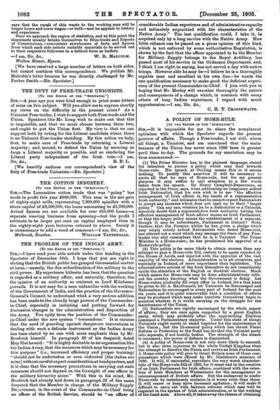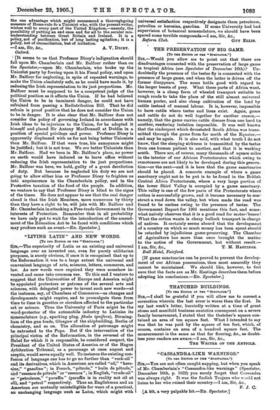[TO THE EDITOR OF THE " ROTATOR-1
SIR,—It is impossible for me to share the complacent optimism with which the Spectator regards the present posture of affairs. Though a Free-trader, I am still, above
all things, a Unionist, and am convinced that the main- tenance of the Union has never since 1886 been in greater peril than to-day. The grounds for my conviction may be
(1) The Prime Minister has, in the plainest language, stated his intention to pursue a policy which may lead towards Home-rule. His speech at Stirling means this or it means nothing. To justify 'this assertion it will be necessary to quote all that he says of Home-rule, but for my present purpose it may suffice to call attention to a few words taken from his speech. Sir Henry Campbell-Bannermau, as reported in the Times, says, when addressing an imaginary ardent Irish Nationalist, that his own wish is to see "the effective management of Irish affairs in the hands of a representative Irish authority," and intimates that he cannot expect Nationalists to accept any measure which does not lead up to their "larger policy." Can any one, whether he be a Nationalist or a Unionist, sincerely doubt that a representative Irish authority having the effective management of Irish affairs means an Irish Parliament, or that the larger policy means the establishment of a separate, though it may be subordinate, Parliament in Ireland ? Note, further, that the Premier, whilst he has given a pledge which may amply satisfy ardent Nationalists who desire Home-rule, has uttered not a word which may assuage the fears of any Free- trader who still remembers that he is a Unionist. The Prime Minister is a Home-ruler; he has proclaimed his approval of a Home-rule policy. (2) This policy is far more likely to obtain success than any attempt to pass a Home-rule Bill, certain to be again rejected by the House of Lords, and rejected with the approval of the vast majority of the electors. Administration is in all countries, and especially in Ireland, of more importance than legislation. The administrative actions of the Irish Executive do not immediately excite the attention of the English or Scottish electors. Much which makes for Home-rule may be done administratively with- out the country knowing what the Government is doing. Let Home-rulers gradually fill every office in Ireland, let a free hand be given to Sir A. MacDonnell, let Unionism be discouraged and Nationalism be encouraged in every part of Ireland for the next six years, and it is quite conceivable that a condition of affairs may be produced which may make loyalists themselves begin to question whether it is worth carrying on the struggle for the maintenance of the Union.
(3) Nationalists are rightly encouraged by the whole aspect of affairs ; they are once again supported by a great English party, which may probably after the approaching Election command a Parliamentary majority. Under this state of things Unionists ought surely to stand together for the maintenance of the Union ; but the ill-omened policy which has thrust Fiscal Reform or Protection to the front has divided the Unionist party into separate, if not hostile, bodies. The strength of the attack is increased ; the power of defence is diminished.
(4) A policy of Home-rule is not only more likely to succeed, but is also more injurious to the whole United Kingdom than the attempt to dissolve the Union and revive an Irish Parliament. A Home-rule policy will give to Great Britain none of those com- pensations which were offered by Mr. Gladstone's measure of 1886. It will, if successful, reproduce the very worst character- istic of the Home-rule Bill of 1893, for it must end in the creation of an Irish Parliament for Irish affairs, combined with the reten- tion of Irish Members at Westminster for the management or mismanagement of British affairs. But the endeavour to confer Home-rule by instalments contains in it worse evils than these. It will renew or keep alive incessant agitation ; it will make it difficult to carry out with fairness reforms which may well be ,required in the system of Irish administration, or in the working of the Land Acts. Above all, it takes away the chance of obtaining the one advantage which might recommend a thoroughgoing measure of Home-rule to a Unionist who, with the present writer, wishes well to every part of the United Kingdom,—namely, the possibility of putting, an end once and for all to the secular mis- understanding between Great Britain and Ireland. It is a policy., not of pacification, but of long lasting agitation; it is a policy, not of reconciliation, but of irritation.
—I am, Sir, &c., A. V. DICEY.
Oxford.
= [It seems to us that Professor Dicey's indignation should fall upon Mr. Chamberlain and Mr. Balfour rather than on the Spectator,—upon Mr. Chamberlain, who broke up the Unionist party by forcing upon it his Fiscal policy, and upon Mr. Balfour for neglecting, in spite of repeated warnings, to make the Union absolutely safe, as he could have made it, by redueing the Irish representation to its just proportions. Mr. Balfour must be supposed to be a competent judge of the political position as it affects the Union. If he had believed the. Union to be in imminent danger, he could not have refrained from passing a Redistribution Bill. That he did refrain is proof positive that he does not consider the Union to be in danger. It is also clear that Mr. Balfour does not consider the policy of governing Ireland in accordance with Irish ideas to be injurious to the Union, for he adopted it himself and placed Sir Antony MacDonnell at Dublin in a position of special privilege and power. Professor Dicey is apparently displeased with us for not being better Unionists than Mr. Balfour. If that were true, his annoyance might be justified; but it is not true. We are better Unionists than Mr. Balfour. Had we been in Mr. Balfour's place, no power on earth would have induced us to leave office without reducing the Irish representation to its just proportions. Mr. Balfour was here, we hold, guilty of a great dereliction of duty. But because he neglected his duty we are not going to allow either him or Professor Dicey to frighten us intS acquiescence in the Chamberlain policy, and in the Proteotive taxation of the food of the people. In addition, we venture to say that Professor Dicey is blind to the signs of the times. He does not appear to see that the real danger ahead is that the Irish Members, more numerous by thirty than they have a right to be, will join with Mr. Balfour and Mr. Chamberlain in attacking a Free-trade Government in the interests of Protection. Remember that in all probability we have only got to wait for the introduction of the amend- ment of the Education Act to be faced with conditions which may produce such an event.—En. Spectator.] "LIVING LATIN" AND NEW WORDS.







































 Previous page
Previous page